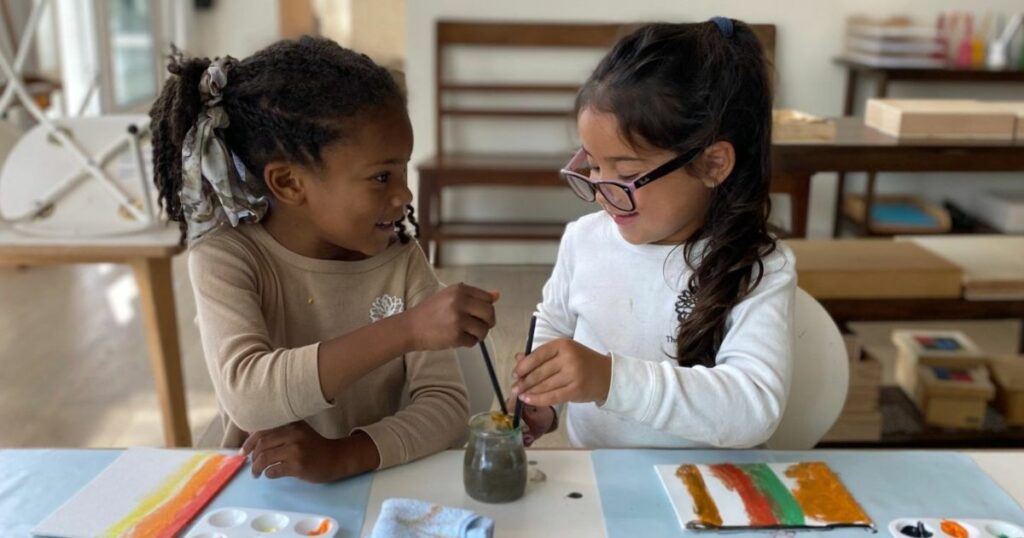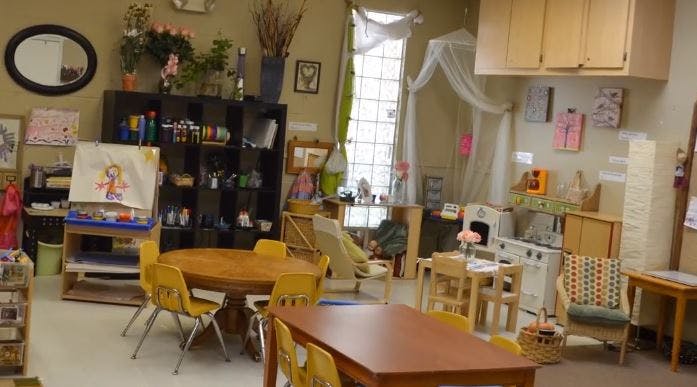Embracing Nature: Montessori’s Inherent Love for the Environment
At the heart of Montessori education lies an innate reverence for nature. Dr. Maria Montessori believed that children, by their very nature, are intrinsically motivated to explore and connect with their surroundings. Nature, with its myriad wonders, provides a dynamic, ever-evolving classroom where young minds can thrive, learn, and grow. Montessori education values the idea of letting children explore at their own pace. Nature, in its vast expanse, offers the perfect setting for this. Whether it’s observing the lifecycle of a butterfly, understanding the flow of water, or examining the patterns of leaves, the natural world provides endless opportunities for inquiry and discovery. Regular interactions with the environment instill a sense of responsibility in children. They come to understand that every living organism has a role and that there’s a delicate balance in nature. This understanding fosters a sense of stewardship. In Montessori settings, children often take up gardening or animal care, learning firsthand about responsibility and the cyclical nature of life.
Nurturing Sustainable Minds: The Montessori Curriculum
The Montessori approach doesn’t merely introduce children to the concept of sustainability—it embeds it within their daily activities. From lessons about the water cycle to the hands-on experience of growing plants, children learn the importance of conservation and ecological balance early on.
Hands-on Environmental Stewardship
True to its core principles, Montessori education encourages children to learn by doing. This hands-on approach is particularly relevant in the realm of environmentalism. Whether it’s planting trees, recycling, or understanding the intricate web of ecosystems, Montessori students become active participants in environmental conservation. Children are not mere passive recipients of knowledge; they actively engage with materials and their surroundings. The curriculum often employs elements from the natural world, be it seashells for counting exercises or leaves for botanical studies. Such tangible interactions foster a deep appreciation for nature, allowing students to understand the world in its most organic form.
Fostering a Global Perspective
In an interconnected world, global challenges require global solutions. The Montessori curriculum, with its emphasis on cosmic education, encourages students to view themselves as global citizens. Understanding global environmental challenges and their implications becomes an integral part of their education. This broadened worldview encourages empathy and the understanding that our actions, no matter how small, can have global implications.
Montessori’s Multi-age Classrooms: Building Environmental Leaders
One of the unique aspects of Montessori schools is the presence of multi-age classrooms. This structure fosters mentorship, collaboration, and leadership. Older students often spearhead environmental initiatives, providing younger peers with role models in sustainability and eco-leadership. By bringing together children of varying ages, typically in three-year age spans, these classrooms create a unique environment that promotes peer learning, mentorship, and a deep sense of community. Within this setting, not only do academic and social skills flourish, but there’s a distinct cultivation of environmental leadership. The collaborative nature of these classrooms, combined with Montessori’s inherent emphasis on nature and sustainability, naturally fosters a generation of young leaders who are acutely aware of environmental responsibilities and ready to champion the cause of Mother Earth.
Integrating Technology and Environmentalism
In the modern age, technology and environmentalism can coexist harmoniously. Montessori classrooms, while rooted in tactile, hands-on experiences, also embrace the advantages technology offers. Students leverage digital tools to track plant growth, understand weather patterns, and even advocate for environmental causes globally. when harnessed correctly, technology can be a powerful tool in bolstering our efforts towards a more sustainable future. Integrating technology within the framework of Montessori education offers an exciting confluence where innovation meets conservation. By leveraging the latest technological tools, Montessori educators are now enhancing students’ understanding of environmental issues, facilitating real-time data collection for scientific inquiries, and sparking curiosity through virtual nature explorations. This seamless amalgamation ensures that as students navigate the digital world, they remain grounded in their commitment to the planet and its well-being.
The Path Forward: Environmentalism as Second Nature
As our world confronts unprecedented environmental challenges, the need for an education system that prioritizes Mother Earth is undeniable. The Montessori methodology, with its deep-rooted respect for nature and emphasis on proactive learning, is leading the way. The Montessori approach, with its foundational emphasis on interconnectedness and respect for all living entities, naturally dovetails with the principles of environmentalism. This synergy offers a transformative educational experience, sculpting the next generation to see environmental stewardship not as an optional endeavor, but as an intrinsic part of their being. Embracing environmentalism as second nature means envisioning a future where sustainable choices are instinctive, where reverence for the Earth is inherent, and where every action, no matter how small, reverberates with purposeful intent to nurture and protect our shared planet.
In wrapping up, the seamless fusion of Montessori principles with environmental consciousness underscores the potential for holistic education systems that nurture not just academically sound minds but also responsible global citizens. As we envision a greener, more sustainable future, Montessori education offers a roadmap, illuminating how education and environmentalism can evolve hand in hand. As society stands at a pivotal crossroads in terms of ecological sustainability, integrating Montessori’s holistic approach with modern environmental advocacy could be the key to fostering a generation deeply attuned to the planet’s needs. This harmonious blend not only enriches the learning experience but also sows the seeds for a future where humans live in balance with nature. As educators, parents, and global citizens, it’s our shared responsibility to ensure that the legacy we leave behind is one of respect, understanding, and proactive stewardship of the world that sustains us.






